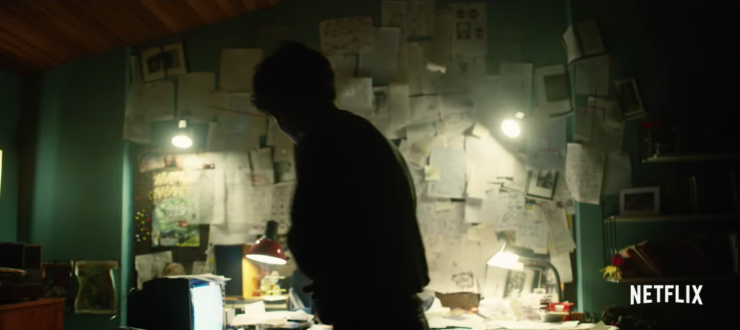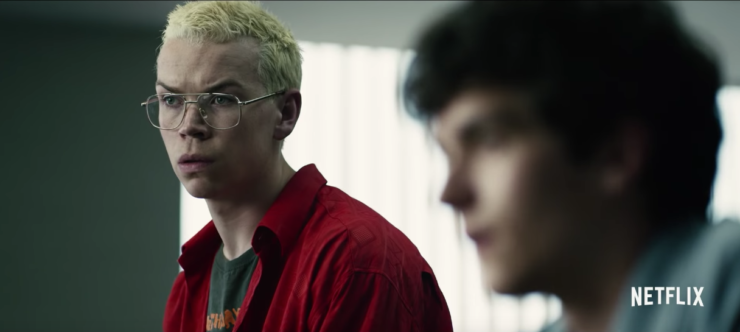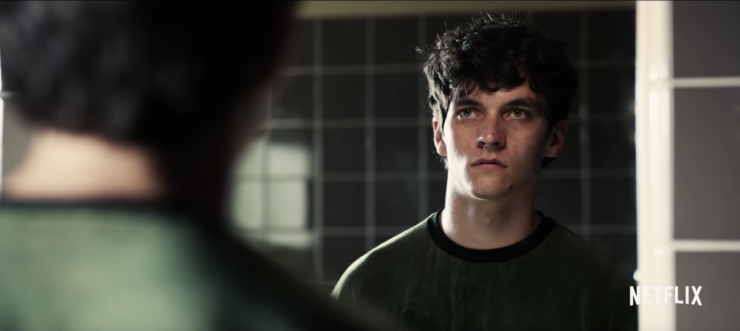Black Mirror: Bandersnatch is without a doubt the series’ most ambitious experiment in storytelling—and that’s saying a lot, since last season kicked off with an entire Galaxy Quest-esque episode. With Bandersnatch, Charlie Brooker and Annabel Jones abandon virtual realities for branching realities, putting control of the rumored 300+ minutes of footage into the hands of their audience. Through dozens of decision trees (which look just like the logo from “White Bear”), passive viewers become active players, deciding everything from what cassette troubled programmer Stefan (Dunkirk’s Fionn Whitehead) listens to on the bus to how to answer his increasingly existential pleas as his fate unspools.
It’s an intrepid move on the part not only of the creators but also Netflix itself, as one of the streaming service’s primary jokes is its tendency to prod viewers into confirming that, yes, they are still watching Friends 20 episodes in. But by the time you’ve satisfied yourself with the second or seventh ending of Bandersnatch, the story is less and less able to match the caliber of the experience of it; go down too many alternate paths, and the format begins to outshine the content. Then again, when was the last time you remembered the plot of a Choose Your Own Adventure novel after closing it?
Non-spoiler review follows, but we will be talking spoilers further down the post, so proceed with caution.
To provide too many plot details would defeat the purpose of walking in Stefan’s shoes, but the key details to know are that the story’s dramatic thrust is whether Stefan will be able to deliver his Bandersnatch demo to video game company Tuckersoft by Christmas 1984. The job is a plum assignment, as it allows Stefan to adapt his favorite dark fantasy novel, a CYOA novel of the same title by the enigmatic and disturbed Jerome F. Davies. It also gets him out of the house, under the warily watchful eye of his glum father (Craig Parkinson), for a reason other than therapy with the sympathetic-but-also-withholding Dr. Haynes (Alice Lowe) to discuss the loss of his mother in early childhood, for which he blames both himself and his dad. Tuckersoft rock star Colin (The Maze Runner‘s Will Poulter), responsible for their popular games Metlhedd and Nohzdyve, seems keen to help Stefan both with his creative process and in really evaluating how much agency he has in his various professional and personal decisions.
At points both mundane and pivotal, you the viewer are prompted to choose one of two actions; you have ten seconds to do so, or (its own fun experiment) let the program do so for you. From there, the narrative follows a typical CYOA model: Some plots are dead ends, either surprisingly immediately or after you’ve invested considerable time and mental energy trying to guess the typical Black Mirror twist or devastating punny turn. In most of these cases, you’ll be redirected to a checkpoint that allows you to choose the alternate path from a major moment… or you’ll revisit the same moment but be prompted with a different choice.
Because as much as Bandersnatch has been marketed as CYOA, its structure hews a bit closer to a roguelike game, in which the player retraces paths or takes alternate routes with privileged information and/or items. This expands the scope of what consequences follow Stefan’s choices, and makes for perhaps the largest and most delightfully bonkers tonal shift we’ve seen from Brooker. It wouldn’t be Black Mirror without the interactive narrative attaining self-awareness.

On our first go, my group (it’s fun to play Bandersnatch by committee) played straight through to what I would believe is the episode’s “truest” ending, judging from the end credits style and how many threads it ties together. That said, we missed a key Act 2 decision that led to an equally satisfying ending, one of the last ones we reached after two hours of noodling around and noticing the recurring alternate choices we were presented with. Depending on what your first ending is, you may find subsequent conclusions anticlimactic, or that the repetitive paths leading there lose their effectiveness with each iteration. At some point, it becomes less alluring to invest the time in starting over from the very beginning; that seems to be where the rumored five hours of footage comes from, though we were satisfied after two hours.
As is the case with any game, YMMV with Bandersnatch. This television event will reward its players’ ingenuity with its various creative solutions and some laugh-out-loud choices, but neither the characters nor core story are strong enough to withstand a half-dozen repetitions of the same key moment.

Do you want to talk spoilers?
Yes | Fuck Yeah
Some of my favorite moments were when the episode aimed more for ambiguity than on-the-nose dialogue. Hearing Colin say “as much as you have a choice” multiple times in the same scene (let alone the same story path) is much less interesting than him ranting on an LSD trip about government conspiracies, with it unclear whether he has actually lived countless parallel lives and or if he just has really good drugs.
To that end, my personal favorite ending was the P.A.C.S. one, in which both Stefan’s parents and therapist are actors and/or scientists, incepting trauma in childhood and tracking his growing awareness of the powers that be tracking their experiment. It adds a sinister edge to so many preceding moments, and thematically mimics “White Bear” beyond just the overwhelming presence of the logo. It also felt the most typically Black Mirror, including all of the Easter eggs like Saint Juniper Hospital, where Rolo Haynes worked in “Black Museum”… and the fact that he shares a surname with Stefan’s therapist Dr. Haynes, who definitely is watching her patient with the look of someone waiting for the other person to figure out a puzzle.
Or maybe I’m just like Stefan, seeking clues and drawing lines between moments because I need it to tie together neatly. In which case, Brooker and Jones know how to cater to my kind of viewer.
Then there’s the ending with an adult Pearl (the first one we achieved), in which history repeats itself to an astonishing degree: Bandersnatch is a hit for Tuckersoft, until the revelation of Stefan following in JFD’s footsteps to the point of decapitating his poor father. Pearl reboots Bandersnatch for Netflix… which means what we’ve been watching for however many hours was her creation… and then she gets caught in the same White Bear decision tree. This felt like the most spiritually fitting end for this particular episode, and highlighted this technology especially well—which has always been the point of a Black Mirror story.
The tech’s ability to prompt the viewer, while incredibly useful to pivot certain decisions to the one you know you should have chosen, also proves frustrating at points. Once it feels like even we viewers are on a predetermined path, it takes away some of the fun of leading your own adventure.
There are so many more branches I could have followed, but let’s take this to the comments! Which ending(s) did you get? Where did you give up, and what were your favorite/least favorite moments?
The roguelike suggestion comes from Natalie Zutter‘s husband; she would have said more Groundhog Day, or Happy Death Day. Talk Black Mirror with her on Twitter!










